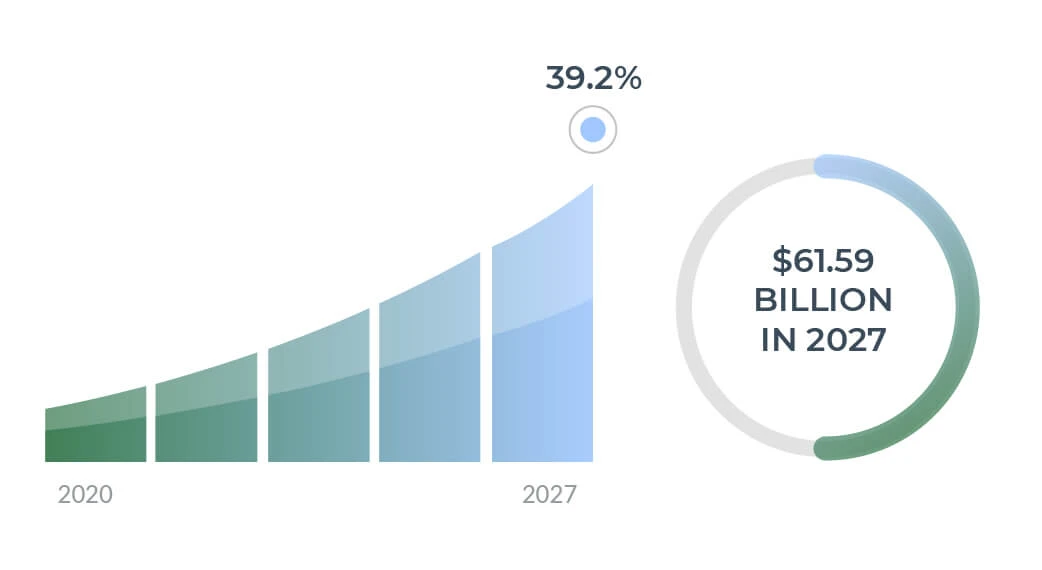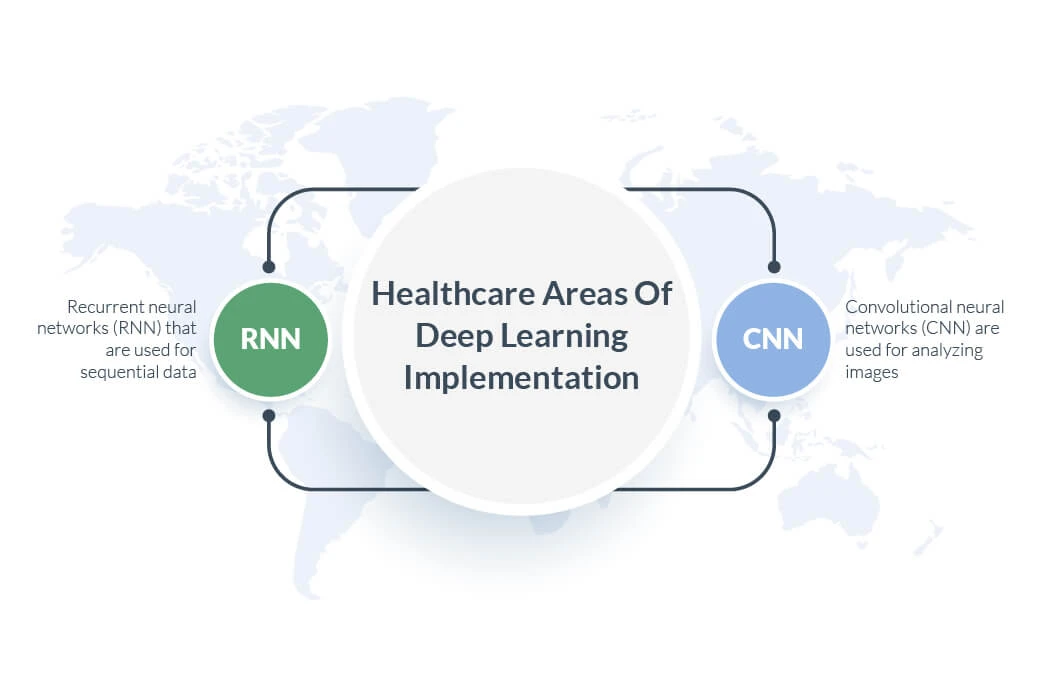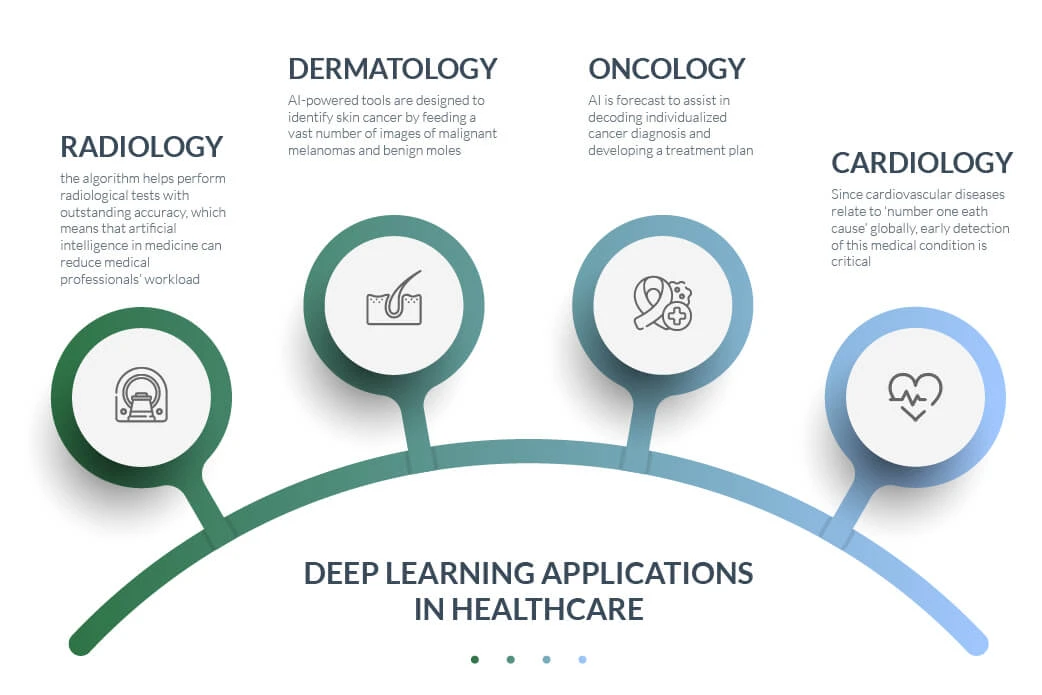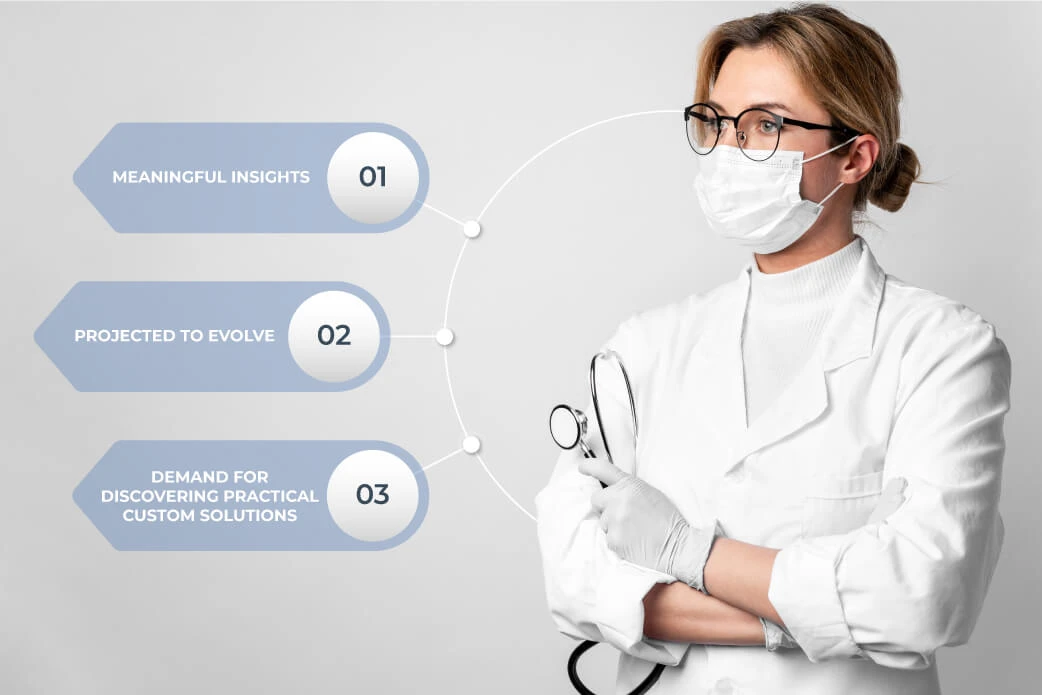Why Deep Learning In Healthcare Is Your Best Bet To Invest


Deep Learning: Behind the Concept
Deep learning finds a wide range of applications putting it in great demand across multiple industries from car manufacturing to medical devices.
Due to the success of its implementation for improvement of healthcare quality and ‘the evidence of deep learning applications on the past epidemic’, the area of the greatest interest at the moment is healthcare.
Overall, the abundance of biomedical data increases the usage of deep learning in healthcare exponentially. But before diving into understanding how the deep learning paradigm is implemented in medicine and how it is changing the healthcare industry on a global scale, it is important to see behind the notions and differentiate the terms of artificial intelligence, machine learning, and deep learning.
Artificial intelligence implies the performance of tasks that otherwise would require human intelligence. Meanwhile, machine learning embarks on diverse techniques that are used to achieve computer learning without explicit programming.
And deep learning is a specific subset of neural networks that features wide capabilities of maintenance of predictive models.
Thus, it introduces myriads of new opportunities across lots of healthcare-related domains. In particular, it is gaining popularity in diagnosis, biomedical informatics, and other areas we are addressing below.
How AI and deep learning are changing the healthcare industry
Deep learning has been rooted in technological use since the 1950s but only in the 2000s, we began witnessing the removal of limitations that were previously slowing down the widespread AI and deep learning application.
Recently, it has translated in the estimation of the overall growth of the deep learning solutions market by 39.2% between 2020-2027 while the global artificial intelligence in healthcare is forecast to reach a market size of $61.59 billion in 2027.

Besides, given the fact that deep neural networks imply varying architecture and widening the scope of tasks that the system can perform, AI-powered solutions successfully deliver:
- data insights based on analysis of vast datasets
- predictive analysis that improves medical outcomes.
Furthermore, deep learning and AI in medicine can considerably:
- reduce time on mundane tasks
- save efforts of medical professionals for research
- assist in achieving a deeper engagement of healthcare customers.
Healthcare Areas Of Deep Learning Implementation
There are mostly two types of deep learning based approaches:
- Convolutional neural networks (CNN) are used for analyzing images
- Recurrent neural networks (RNN) are used for sequential data (for example, sequencing blood test results, genetic sequences, etc.)

The key benefits of these two approaches are down to the fact that they enable medical professionals to analyze new types of information, which opens up a whole realm of new possibilities in applying deep learning techniques for medical analysis and making a medical diagnosis using machine learning much easier.
Nowadays, aside from demonstrating the functionality of a full-fledged diagnostic tool, AI applications in healthcare are most actively implemented for the purpose of:
- performing robotic surgery procedures
- facilitating administrative flow
- analysis of biomedical images
- optimizing costs of the drug discovery process
- providing telehealth services including AI-based virtual assistants
Specifics of deep learning application in healthcare can be illustrated on the example of deep learning medical image processing we discuss below.
Deep Learning Medical Imaging
Essentially, medical imaging with deep learning includes several basic steps:
- starting off with the images
- applying them through multiple different layers of deep neural network
As a result, it instantly classifies the image in the medical context and gives us a useful output in terms of diagnosis.
How It Works: CNN systems are designed to help clinicians to do their work including selecting cellular elements of pathological slides, properly identifying their spatial orientation, and grading them for diagnostic purposes
Due to the high accuracy rate of this simple and clear procedure, medical image classification with a convolutional neural network is one of the deep learning applications that gained massive popularity among healthcare providers. Whether it is image reconstruction, image synthesis, or tumor segmentation, deep learning in medical images analysis performs with equally high precision.
It allows further data training and, in the long run, recapitulating diagnostic decisions for ensuring the proper treatment plan and increase of positive medical outcome.

Deep Learning Applications In Healthcare
With the recent breakthroughs in big data, the ability to develop end-to-end learning models from raw complex data brought deep learning technologies to a new level, and the number of machine learning use cases in healthcare has significantly increased. In particular, the most innovative healthcare projects are implemented in:
- Radiology. The algorithm helps perform radiological tests with outstanding accuracy, which means that artificial intelligence in medicine can reduce medical professionals’ workload and radically transform the state of healthcare in less developed or remote rural areas.
- Dermatology. AI-powered tools are designed to identify skin cancer by feeding a vast number of images of malignant melanomas and benign moles.
- Oncology. AI is forecast to assist in decoding individualized cancer diagnoses and developing a treatment plan. An example of such an app is Watson by IBM, a powerful tool that is mainly used in the oncology field.
- Cardiology. Since cardiovascular diseases relate to number-one-death-cause globally, early detection of this medical condition is critical. Thus, AI-based tools can be applied for identifying risk factors with retinal medical image analysis.

Challenges For Deep Learning In Healthcare
Obtaining meaningful insights from raw multi-dimensional biomedical data is still a major challenge in healthcare.
While the promise of artificial intelligence in healthcare and deep learning potential is strong, it has not yet been able to live up either to expectations of fighting cancer or standards of universally applicable tools completely excluding biases or errors.
Due to the complex unstructured character of data fed from health records, medical images, bioinformatics, sensor-based tools, it also puts challenges on how fast deep learning in healthcare is projected to evolve.
Aside from the conceptual challenges, there is also a demand for discovering practical custom solutions for minor issues like dealing with large size images in multiple dimensions, dimensionality of datasets, identifying the status of “hard-for-forced-learning” cases like subtle abnormalities, or collecting relevant biomarkers.
However, while hospitals and healthcare providers collect more and more data and analyzing it puts challenges, it also creates huge opportunities in the future.

Present And Future Of Deep Learning In Healthcare
Recently, the implementation of deep learning for the analysis of biomedical data has drawn lots of attention. Biological and medical devices, medical treatment, health applications are capable of generating large volumes of data presented by images, charts, text, or audio signals, which ‘feeds’ the potential of deep learning in medicine for the detection and diagnosis of diseases. The trends that will prevail include image-based deep learning, diversification of health informatics, increasing remote-oriented personalized services.
Overall, deep learning has demonstrated a positive impact on businesses thriving for accomplishing the mission of providing value-based healthcare.
Assessing the different perspectives of deep learning in healthcare, we can expect that its future is linked to a telehealth app development company and favoring custom healthcare solutions.
FAQ
As in other industries, high technologies as AI and Deep Learning can significantly improve the overall quality of healthcare services, as well as automate many routine processes that were time-consuming previously.
Of course, it is already in use. AI-powered solutions help to quickly analyze large amounts of data, including those related to making a primary diagnosis.
Of course, it is. Like any high technology that has not yet been studied at its full, Deep Learning is of great interest both on the labor market and from the business side.
Build your ideal
software today

